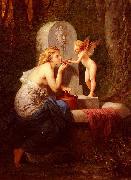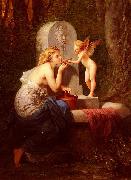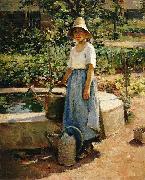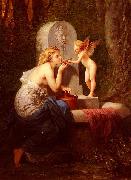Wholesale Oil Painting No Minimum |
|||||||||||
|
|
|||||||||||

|
|||||||||||
|
|
|
||||||||
Henri-Pierre Picou(27 February 1824 - 17 July 1895) was a French painter born in Nantes.His oeuvre began with portraits and classical historical subject matter but he later moved on to allegorical and mythological themes.He was an academic painter and one of the founders of the Neo-Grec school, along with his close friends Gustave Boulanger, Jean-L??on G??rôme, and Jean-Louis Hamon, also academic painters. All of them studied in the workshops of both Paul Delaroche and later Charles Gleyre. Picou's style was noticeably influenced by Gleyre. While the rest of the group generally painted classical and mythological subjects, Picou also received commissions for large religious frescoes from many churches, including the Église Saint-Roch. His artistic debut was at the Salon in 1847. The next year he was awarded a second-class medal for his painting, Cl??opâtre et Antoine sur le Cydnus. Also known as Cleopatra on the Cydnus, it is commonly regarded as Picou's masterpiece. This showing at the Salon in 1848 was written about by the critic Th??ophile Gautier, who felt that the subject matter was too ambitious, but also said that "As it is, it gives the best hope for the future of the young artist, and ranks among the seven or eight most important paintings of the Salon.In 1875 the painting was exhibited in New York, and afterward found lodgment on the walls of a private art gallery in San Francisco.Picou maintained a large workshop in Paris on the Boulevard de Magenta, which provided him room to work on his expansive frescoes. His popularity continued to rise and he went on to win the Second Prix de Rome in 1853 for his painting, J??sus chassant les vendeurs du Temple (The Moneylenders Chased from the Temple), and another second-class medal for his Salon painting in 1857. From his debut in 1847, he was a regular at the Salon, showing almost every year until his final exhibit in 1893.He has been called the most fashionable painter towards the close of the Second French Empire |
||||||||
|
|
||||||||
At The Fountain
At The Fountain Painting ID:: 67585 |
1880(1880)
Oil on canvas
61 X 81.3 cm (24.02 X 32.01 in)
1880(1880) Oil on canvas 61 X 81.3 cm (24.02 X 32.01 in) |
|||||||
|
|
||||||||
Henri-Pierre Picou(27 February 1824 - 17 July 1895) was a French painter born in Nantes.His oeuvre began with portraits and classical historical subject matter but he later moved on to allegorical and mythological themes.He was an academic painter and one of the founders of the Neo-Grec school, along with his close friends Gustave Boulanger, Jean-L??on G??rôme, and Jean-Louis Hamon, also academic painters. All of them studied in the workshops of both Paul Delaroche and later Charles Gleyre. Picou's style was noticeably influenced by Gleyre. While the rest of the group generally painted classical and mythological subjects, Picou also received commissions for large religious frescoes from many churches, including the Église Saint-Roch. His artistic debut was at the Salon in 1847. The next year he was awarded a second-class medal for his painting, Cl??opâtre et Antoine sur le Cydnus. Also known as Cleopatra on the Cydnus, it is commonly regarded as Picou's masterpiece. This showing at the Salon in 1848 was written about by the critic Th??ophile Gautier, who felt that the subject matter was too ambitious, but also said that "As it is, it gives the best hope for the future of the young artist, and ranks among the seven or eight most important paintings of the Salon.In 1875 the painting was exhibited in New York, and afterward found lodgment on the walls of a private art gallery in San Francisco.Picou maintained a large workshop in Paris on the Boulevard de Magenta, which provided him room to work on his expansive frescoes. His popularity continued to rise and he went on to win the Second Prix de Rome in 1853 for his painting, J??sus chassant les vendeurs du Temple (The Moneylenders Chased from the Temple), and another second-class medal for his Salon painting in 1857. From his debut in 1847, he was a regular at the Salon, showing almost every year until his final exhibit in 1893.He has been called the most fashionable painter towards the close of the Second French Empire |
||||||||
|
|
||||||||
|
|
At The Fountain
At The Fountain Painting ID:: 72724 |
1880(1880)
Oil on canvas
61 X 81.3 cm (24.02 X 32.01 in)
cjr 1880(1880) Oil on canvas 61 X 81.3 cm (24.02 X 32.01 in) cjr |
||||||
|
|
||||||||
Theodore Robinson1852-1896 Theodore Robinson (July 3, 1852 ?C April 2, 1896) was an American painter best known for his impressionist landscapes. He was one of the first American artists to take up impressionism in the late 1880s, visiting Giverny and developing a close friendship with Claude Monet. Several of his works are considered masterpieces of American Impressionism. In 1884 Robinson returned to France where he would live for the next eight years, visiting America only occasionally. Robinson gravitated to Giverny, which had become a center of French impressionist art under the influence of Claude Monet. La Debacle, 1892, collection: Scripps College, Claremont, CaliforniaHistorians are unclear when Robinson met Monet, but by 1888 their friendship was enough for Robinson to move in next door to the famous impressionist. Robinson's art shifted to a more traditional impressionistic manner during this time, likely due to Monet's influence. While a number of American artists had gathered at Giverny, none were as close to Monet as Robinson. Monet offered advice to Robinson, and he likewise solicited Robinson for opinions on Monet's own works in progress. At Giverny, Robinson painted what art historians regard as some of his finest works. These depicted the surrounding countryside in different weather, in the plein air tradition, sometimes with women shown in leisurely poses. An example of his mature work during this period is La Debacle (1892) in the collection of Scripps College, Claremont California. |
||||||||
|
|
||||||||
|
|
At the Fountain
At the Fountain Painting ID:: 73540 |
Date c.1890
Medium Oil on canvas
Dimensions Deutsch: 81.28 x 66.04 cm
cyf Date c.1890 Medium Oil on canvas Dimensions Deutsch: 81.28 x 66.04 cm cyf |
||||||
|
|
||||||||
Henri-Pierre Picou(27 February 1824 - 17 July 1895) was a French painter born in Nantes.His oeuvre began with portraits and classical historical subject matter but he later moved on to allegorical and mythological themes.He was an academic painter and one of the founders of the Neo-Grec school, along with his close friends Gustave Boulanger, Jean-L??on G??rôme, and Jean-Louis Hamon, also academic painters. All of them studied in the workshops of both Paul Delaroche and later Charles Gleyre. Picou's style was noticeably influenced by Gleyre. While the rest of the group generally painted classical and mythological subjects, Picou also received commissions for large religious frescoes from many churches, including the Église Saint-Roch. His artistic debut was at the Salon in 1847. The next year he was awarded a second-class medal for his painting, Cl??opâtre et Antoine sur le Cydnus. Also known as Cleopatra on the Cydnus, it is commonly regarded as Picou's masterpiece. This showing at the Salon in 1848 was written about by the critic Th??ophile Gautier, who felt that the subject matter was too ambitious, but also said that "As it is, it gives the best hope for the future of the young artist, and ranks among the seven or eight most important paintings of the Salon.In 1875 the painting was exhibited in New York, and afterward found lodgment on the walls of a private art gallery in San Francisco.Picou maintained a large workshop in Paris on the Boulevard de Magenta, which provided him room to work on his expansive frescoes. His popularity continued to rise and he went on to win the Second Prix de Rome in 1853 for his painting, J??sus chassant les vendeurs du Temple (The Moneylenders Chased from the Temple), and another second-class medal for his Salon painting in 1857. From his debut in 1847, he was a regular at the Salon, showing almost every year until his final exhibit in 1893.He has been called the most fashionable painter towards the close of the Second French Empire |
||||||||
|
|
||||||||
|
|
At The Fountain
At The Fountain Painting ID:: 74543 |
Date 1880(1880)
Medium Oil on canvas
Dimensions 61 X 81.3 cm (24.02 X 32.01 in)
cyf
Date 1880(1880) Medium Oil on canvas Dimensions 61 X 81.3 cm (24.02 X 32.01 in) cyf |
||||||
|
|
||||||||
|
Henri-Pierre Picou (27 February 1824 - 17 July 1895) was a French painter born in Nantes.His oeuvre began with portraits and classical historical subject matter but he later moved on to allegorical and mythological themes.He was an academic painter and one of the founders of the Neo-Grec school, along with his close friends Gustave Boulanger, Jean-L??on G??rôme, and Jean-Louis Hamon, also academic painters. All of them studied in the workshops of both Paul Delaroche and later Charles Gleyre. Picou's style was noticeably influenced by Gleyre. While the rest of the group generally painted classical and mythological subjects, Picou also received commissions for large religious frescoes from many churches, including the Église Saint-Roch. His artistic debut was at the Salon in 1847. The next year he was awarded a second-class medal for his painting, Cl??opâtre et Antoine sur le Cydnus. Also known as Cleopatra on the Cydnus, it is commonly regarded as Picou's masterpiece. This showing at the Salon in 1848 was written about by the critic Th??ophile Gautier, who felt that the subject matter was too ambitious, but also said that "As it is, it gives the best hope for the future of the young artist, and ranks among the seven or eight most important paintings of the Salon.In 1875 the painting was exhibited in New York, and afterward found lodgment on the walls of a private art gallery in San Francisco.Picou maintained a large workshop in Paris on the Boulevard de Magenta, which provided him room to work on his expansive frescoes. His popularity continued to rise and he went on to win the Second Prix de Rome in 1853 for his painting, J??sus chassant les vendeurs du Temple (The Moneylenders Chased from the Temple), and another second-class medal for his Salon painting in 1857. From his debut in 1847, he was a regular at the Salon, showing almost every year until his final exhibit in 1893.He has been called the most fashionable painter towards the close of the Second French Empire At The Fountain Date 1880(1880) Medium Oil on canvas Dimensions 61 X 81.3 cm (24.02 X 32.01 in) cyf |
||||||||
|
|
||||||||
|
Prev Next
|
||||||||
|
|
||||||||
|
Related Paintings to Henri-Pierre Picou :. |
||||||||
|
|
||||||||
|
CONTACT US |




